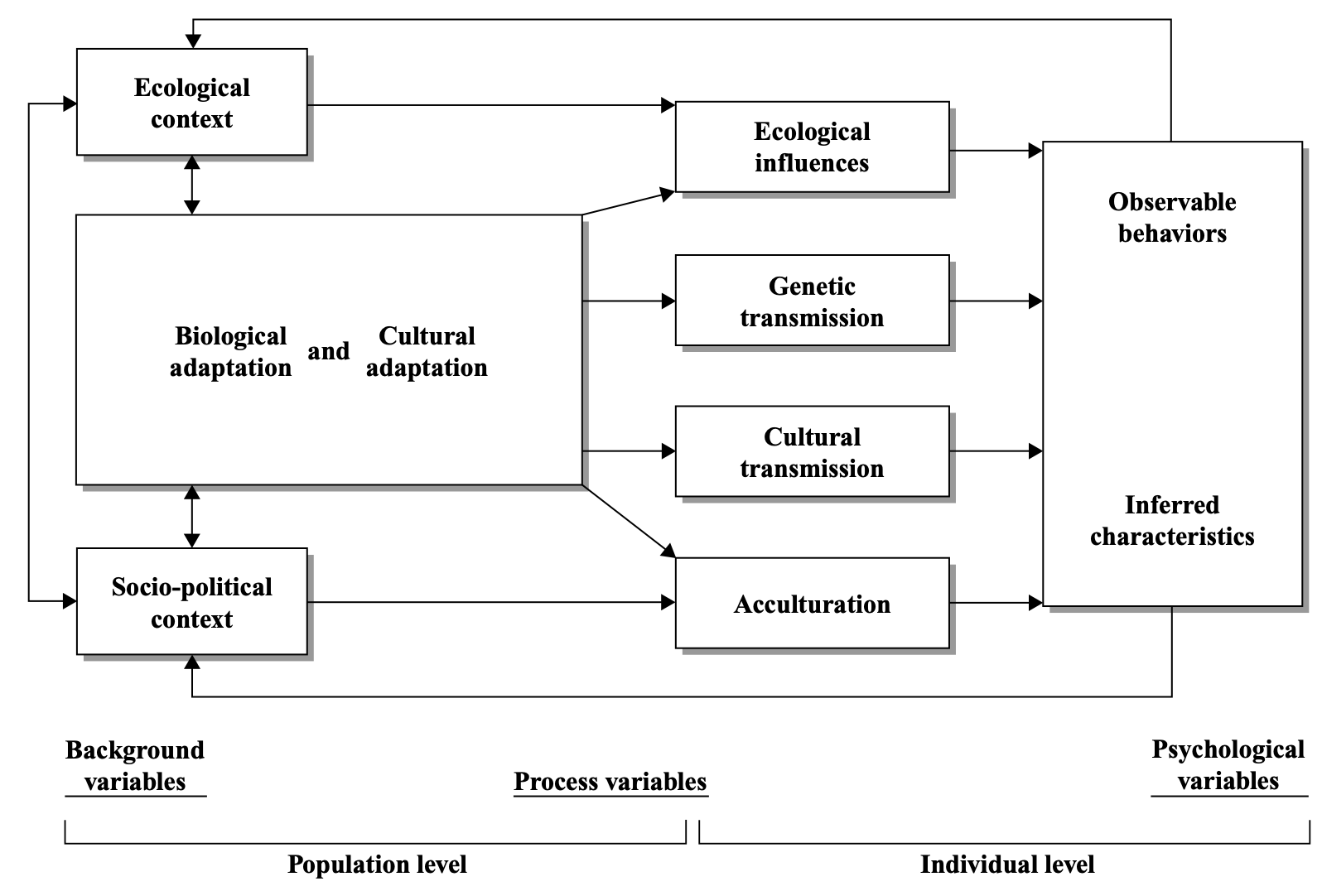Introduction to Cross-Cultural Psychology
Chapter – 1
Table of Contents
What is cross-cultural psychology?
- Cross-cultural psychology studies variations in human behavior influenced by cultural context.
- Definitions highlight key aspects: comparison of psychological variables under different cultural conditions, identification of causes of behavior differences, and the interactive relationship between culture and behavior.
- Culture is defined as the shared way of life of a group of people.
- Core issues include distinguishing culture and behavior and understanding their relationship.
- Cross-cultural psychology encompasses both culture-comparative and cultural perspectives.
- It examines both diversity and uniformity in human psychology.
- Considers contextual variables like biological and ecological factors.
- Not limited to cross-national comparisons; includes studies within a single nation state of various ethnocultural groups.
- Focuses on intercultural behavior resulting from contact between cultures and ongoing changes.
- General definition: study of similarities and differences in individual psychological functioning across various cultural and ethnocultural groups; relationships between psychological variables and socio-cultural, ecological, and biological factors; and ongoing changes in these variables.
Goals of cross-cultural psychology
- Cross-cultural psychology aims to test the generality of existing psychological knowledge and theories.
- Known as the transport and test goal, it involves transferring hypotheses to different cultural settings to assess their validity and applicability.
- Another goal is to explore cultural variations not present in one’s own culture, beyond mere failure to replicate findings.
- This exploration leads to a deeper understanding of cultural influences on behavior.
- The ultimate goal is to integrate findings from various cultures into a more universal psychology.
- It is assumed that there are underlying universal psychological processes across human cultures.
- Three theoretical orientations in cross-cultural psychology are absolutism, relativism, and universalism.
- Absolutism assumes psychological phenomena are the same across cultures.
- Relativism holds that all human behavior is culturally patterned and comparisons are problematic.
- Universalism assumes common basic psychological processes but acknowledges cultural variations in behavior.
- Universalism seeks to understand cultural influences on behavioral diversity and allows for comparisons across cultures.
Relationships with other disciplines
- Cross-cultural psychology is international and interdisciplinary, drawing from fields such as anthropology, biology, ecology, linguistics, sociology, and psychology.
- It aims to establish systematic relationships between population-level data and individual psychological data.
- Avoids reductionism by recognizing phenomena at different levels of analysis (e.g., cultural, psychological, biological).
- Population-level disciplines (e.g., anthropology) focus on understanding whole populations, while psychology focuses on individual-level phenomena.
- Anthropologists tend to adopt naturalistic approaches, while psychologists often use experimental methods.
- Bridging between naturalism and experimentation is crucial for interdisciplinary understanding.
- Jahoda’s analyses explore the historical relationship between anthropology and psychology, highlighting periods of interaction and neglect/hostility.
- Recent decades have seen increased collaboration between anthropologists and psychologists, particularly in areas like psychological anthropology.
Ethnocentrism in psychology
- Ethnocentrism is the differential evaluation of differences between groups, often leading to viewing one’s own group as superior.
- It involves using one’s own group’s standards as the standard when evaluating other groups.
- Ethnocentrism can lead to incorrect interpretations of behavior, affect instrument design, influence choice of research topics, and bias formulation of theories.
- Cross-cultural psychology aims to reduce ethnocentrism by recognizing the limitations of current knowledge and seeking to extend data and theory through inclusion of other cultures.
- Campbell’s proposal suggests carrying out cross-cultural research projects four times to distinguish between differences arising from researcher bias and actual cultural differences.
- While principles of behavior with universal validity can be formulated, psychology remains Western-centric until alternative approaches from other cultures are extensively tested.
- Indigenous psychologies offer non-Western approaches, but their impact on psychology as a science is limited due to scientific colonialism.
- The extent of scientific colonialism in psychology is significant, making it challenging to remedy and reflecting limitations in contemporary psychological knowledge.
A general framework for cross-cultural psychology
- The ecocultural framework provides a conceptual scheme for understanding the relationships between ecological, cultural, and individual-level variables in cross-cultural psychology.
- Derived from the work of Malinowski and Rivers, it proposes linkages between ecology, culture, and behavior.
- The framework distinguishes between population-level variables (left) and individual-level outcomes (right), with a flow from left to right representing influences on individual behavior.
- Feedback relationships are acknowledged, although only two are illustrated in the framework.
- Ecological context encompasses the setting where human organisms interact with the physical environment, influencing cultural and psychological development.
- Economic activity is a central feature of the ecological context, with different forms of economic activity implying varying cultural, biological, and psychological outcomes.
- Adaptation at the population level involves considering both cultural and biological influences on behavior.
- Process variables include genetic and cultural transmission, as well as acculturation resulting from culture contact.
- Not all outcomes are mediated by ecological relationships; some are direct and immediate, such as environmental learning or nutritional deficiency.
- Individuals can recognize, screen, appraise, and alter influences, leading to wide individual differences in psychological outcomes.
- The ecocultural framework helps account for both differences and similarities in psychological characteristics within and across groups.

Conclusion
- Cross-cultural psychology draws from established scientific traditions including biology, general psychology, and social sciences like cultural anthropology, operating as an “inter-discipline” focusing on population-level influences on individual-level psychological functioning.
- It adopts a non-ethnocentric standpoint while aiming for the long-term goal of generating universal psychological laws.
- The theoretical approach emphasizes the importance of both cultural context and cross-cultural comparison in understanding human psychological phenomena, acknowledging reciprocal relationships between culture and behavior at distinct levels of analysis.
- Methodologically, cross-cultural psychology occupies an intermediate position between pure phenomenology and unrestricted positivism, prioritizing empirical studies to test theoretical notions.
- The interpretation of observed behavioral differences between cultural groups is subject to inherent ambiguity, requiring a critical perspective to avoid overlooking shortcomings and artifacts in intergroup comparisons.
